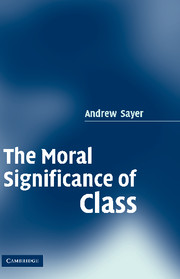Book contents
- Frontmatter
- Contents
- Preface and acknowledgements
- 1 Introduction
- 2 From the habitus to ethical dispositions
- 3 Recognition and distribution
- 4 Concepts of class: clearing the ground
- 5 Struggles of the social field
- 6 Moral and immoral sentiments and class
- 7 Responses to class I: egalitarianism, respect(ability), class pride and moral boundary drawing
- 8 Responses to class II: explanations, justifications and embarrassment
- 9 Conclusions and implications
- Bibliography
- Index
8 - Responses to class II: explanations, justifications and embarrassment
Published online by Cambridge University Press: 22 September 2009
- Frontmatter
- Contents
- Preface and acknowledgements
- 1 Introduction
- 2 From the habitus to ethical dispositions
- 3 Recognition and distribution
- 4 Concepts of class: clearing the ground
- 5 Struggles of the social field
- 6 Moral and immoral sentiments and class
- 7 Responses to class I: egalitarianism, respect(ability), class pride and moral boundary drawing
- 8 Responses to class II: explanations, justifications and embarrassment
- 9 Conclusions and implications
- Bibliography
- Index
Summary
Introduction
In this chapter we examine how people explain and evaluate behaviour in relation to class, and how they regard class itself. As we noted at the outset, normative evaluation is likely to be more important to people than positive understanding of their situation. Yet these lay normative valuations are also part of their situation, and, while they are often questionable, they usually reveal something about both that context and their holders, and are therefore worth probing for both positive and normative insights. Lay attempts to understand and evaluate the behaviour of members of their own and other classes involve many slippages and blockages but these are themselves instructive. Such reflections could be seen as lay sociologies and philosophies: indeed, some of the problems they run into are not unlike those found in those disciplines – problems of determinism and free will, explaining and justifying, and weighing and relating social causes and individual responsibility. Quite apart from all the likely distortions of judgement produced by entrenched inequalities and the need for self-justification, questions of blaming and praising and attributing responsibility are inherently difficult, raising deep metaphysical issues that have been the subject of considerable philosophical debate (Williams, 2003, 2004a). Lay views of class itself are also complex, involving a tendency for normative judgements of class and position within the class structure to override positive assessments of what class is. Above all, attitudes to class are characterised by embarrassment, defensiveness, denial and evasion, indicating its morally problematic character.
Information
- Type
- Chapter
- Information
- The Moral Significance of Class , pp. 187 - 212Publisher: Cambridge University PressPrint publication year: 2005
